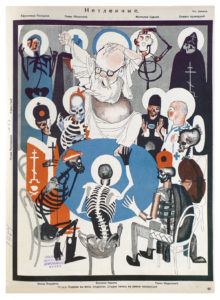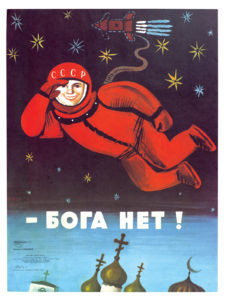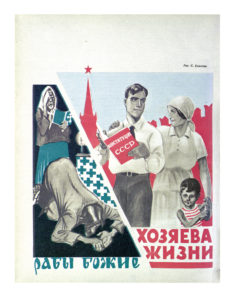The Soviet Union used propaganda as part of its war on religion
The anti-religion campaigns of Richard Dawkins and co. seem like a modern phenomenon, very much a 21st century internet sort-of thing. But if you do a little digging you will find that there is in fact not much that is new under the sun, and that the same arguments and counter-arguments have been regurgitated before, and on numerous occasions.
The most vicious and sustained of these campaigns began around a century ago, part of a huge social experiment in state atheism that is largely forgotten or ignored. Although I know that the people who create our curriculums would prefer to skip over the complete failure of the utopian regimes that cast such a long shadow over the 20th century (the body count was only 100 million or so, and it was so long ago after all) I confess I am always a little taken aback whenever I discover how little otherwise well-educated people know about that grand experiment in human misery.
In fact, for generations on the left, God was generally viewed as an obstacle to progress, and religious faith a superstition to be liberated from — Marx’s “opium of the people” and all that. Recently, however, I was chatting with a smart young man who described himself as a socialist, and he had no idea that the USSR had repressed religion throughout its existence. But then, he was under 40, couldn’t remember the Cold War, and his generation’s Left has grown exquisitely sensitive to religion (or at least the most intolerant forms of one religion in particular).
So it’s all gone down the memory hole. And not only here, but also in Russia, the erstwhile ground zero of state atheism. Following the collapse of the USSR, the Orthodox Church quickly re-established itself as a powerful influence on society, priests took to blessing tanks and missiles (although the Church recently moved to limit this) and an ex-KGB agent named Vladimir Putin became president and subsequently declared himself a defender of Christian values against the malign influence of the decadent, secular West.

Images such as this, issued in 1924, were used to portray the churches as backwards and rapacious. The text reads: “God the Father: You’ve let me down, my minions. I’m ashamed to be seen on Earth now!”
But that world of aggressive and at times extremely violent atheism was very real, and I think we should not only remember it, but seek to understand it. A new book, Godless Utopia: Soviet Anti-Religious Propaganda by Roland Elliott Brown, is helpful in that regard. A combination of primer on the history of Soviet state atheism and art book collecting insulting caricatures of deities and their earthly representatives, it vividly captures a sustained, blasphemous, mocking, abusive intolerance so vicious that the so-called New Atheists of the mid-2000s come off like Keith Harris and Orville in comparison.

 Main Edition
Main Edition US
US FR
FR










Join the discussion
Join like minded readers that support our journalism by becoming a paid subscriber
To join the discussion in the comments, become a paid subscriber.
Join like minded readers that support our journalism, read unlimited articles and enjoy other subscriber-only benefits.
SubscribeAnother inspiring and informative piece. The throughtfulness of spreading a message of calm and peace in troubled times is a testament to your humanity.
Thank you for allowing us into your heart with your beautiful playlist in this time, Douglas – as inspiring as your writing. And thank you for remembering our neglected genius friend Olivier Messiaen, who really does soar in the same lineage of Bach and those other wonderful musicians. And especially in that uplifting blood-curdling Apparition (enough to almost convert you into a devout penitent Christian)